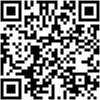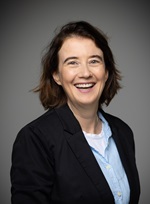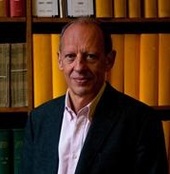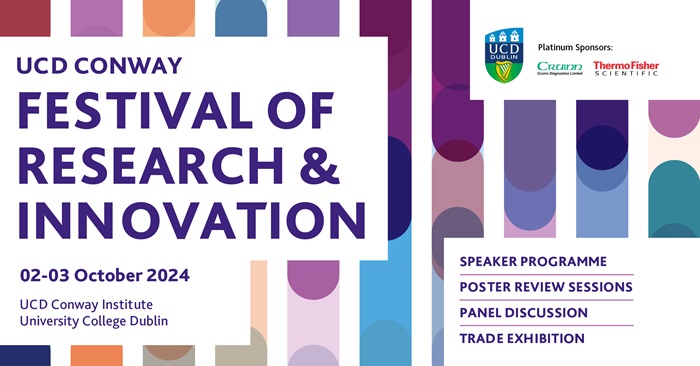Celebrating research and innovation outputs from across the Institute in areas of Personalised & Translational Medicine; Discovery Research & One Health.
Join us for a programme of plenary and invited guest speakers, oral and poster presentations from early career researchers, a panel discussion and trade exhibition.
Register via: bit.ly/ConwayFest24
Download the programme via Eventee

Show/hide content Open Close All
'A Hitchhiker’s and Backpacker’s Guide to Therapeutics and Biomaterials Development'
Polymer or lipid-based therapeutic delivery systems are widely explored to improve the biological outcome of chemo and immunotherapy. However, poor vascular circulation, limited targeting and the inability to negotiate many biological barriers are key hurdles in their clinical translation. Biology has provided many examples of successful “carriers” in the form of circulatory cells, which routinely overcome the hurdles faced by synthetic carrier systems. We have explored “cellular hitchhiking and backpacking” approaches which involve combining synthetic particles with circulatory cells to drastically alter the in vivo fate of particles as well as the cells. I will provide an overview of the principles and applications of hitchhiking and backpacking approaches for therapeutic delivery, cell therapy and regenerative medicine.
 (1).jpg) Biography: Samir Mitragotri is the Hiller Professor of Bioengineering and Hansjorg Wyss Professor of Biologically Inspired Engineering at Harvard University and Wyss Institute. His research is focused on therapeutic and biomaterial development. His research has led to new technologies for treating many diseases. He is an elected member of the US National Academy of Engineering, US National Academy of Medicine and US National Academy of Inventors. He is an author on over 400 publications and an inventor on over 300 patents/patent applications. His research has led to several companies that have advanced technologies developed by him into clinical and commercial products. He is also an elected fellow of AAAS, CRS, BMES, AIMBE, and AAPS. He received BS in Chemical Engineering from the Institute of Chemical Technology, India and PhD in Chemical Engineering from the Massachusetts Institute of Technology.
Biography: Samir Mitragotri is the Hiller Professor of Bioengineering and Hansjorg Wyss Professor of Biologically Inspired Engineering at Harvard University and Wyss Institute. His research is focused on therapeutic and biomaterial development. His research has led to new technologies for treating many diseases. He is an elected member of the US National Academy of Engineering, US National Academy of Medicine and US National Academy of Inventors. He is an author on over 400 publications and an inventor on over 300 patents/patent applications. His research has led to several companies that have advanced technologies developed by him into clinical and commercial products. He is also an elected fellow of AAAS, CRS, BMES, AIMBE, and AAPS. He received BS in Chemical Engineering from the Institute of Chemical Technology, India and PhD in Chemical Engineering from the Massachusetts Institute of Technology.
'Genome regulation: shining light on the dark matter'
Precise regulation of gene expression is essential for almost all biological processes, and when it goes awry, can lead to a wide-range of human diseases. Gene expression is initiated by enhancers, which are non-coding elements that recruit transcription factors to regulate when and where genes are expression. As many enhancers are located upstream, downstream or in the introns of other genes, they need to come into physical proximity to their target gene. What controls the specificity, timing and regulation of these enhancer-promoter ‘loops’ are current key questions. I will discuss how we are combining genetics, single cell genomics and computational inference to dissect this during embryonic development. These questions are fundamental to how our genomes are regulated, and have far reaching implications to understanding the impact of natural sequence variation on phenotypes such as speciation differences and susceptibility to disease.
Biography:  Professor Eileen Furlong is a UCD graduate who completed her PhD (Pharmacology) under the supervision of Conway Emeritus Fellow, Prof. Finian Martin. Her groundbreaking research provides insights into the inter-relationships between the genome and the environment. Eileen is Head of the Genome Biology Department at the European Molecular Biology Laboratory (EMBL) and elected a member of the European Molecular Biology Organization (EMBO) in 2013, the Academia Europaea in 2016, EMBO’s research council in 2018, and was elected a Fellow of the Royal Society in 2022.
Professor Eileen Furlong is a UCD graduate who completed her PhD (Pharmacology) under the supervision of Conway Emeritus Fellow, Prof. Finian Martin. Her groundbreaking research provides insights into the inter-relationships between the genome and the environment. Eileen is Head of the Genome Biology Department at the European Molecular Biology Laboratory (EMBL) and elected a member of the European Molecular Biology Organization (EMBO) in 2013, the Academia Europaea in 2016, EMBO’s research council in 2018, and was elected a Fellow of the Royal Society in 2022.
“The EPIC study in diet, nutrition and cancer”
The European Prospective Investigation into Cancer (EPIC) is a population-based prospective cohort, with 520,000 participants in 10 European countries, initiated in the 1990s to investigate the role of diet and nutrition in cancer aetiology. EPIC led to the identification of the role of several diet components in cancer causation (red meat, processed meat) and prevention (fruit, vegetables and all-grain cereals) and the discovery of the causal role of obesity and the protective effect of physical activity for several cancers. EPIC studies on biological samples have supported the causal nature of these associations and contributed to the discovery of the role of metabolic deregulations related to insulin resistance and inflammation in the aetiology of several cancers.
Biography: Professor Elio Riboli is Chair in Cancer Epidemiology and Prevention at Imperial College London. He is also Founding Director of the Cancer Epidemiology and Prevention Research Unit, jointly established by Imperial College and the Institute for Cancer Research.  Professor Riboli has made an exceptional impact on the fields of epidemiology, cancer prevention and the fight against chronic illness. While working at the International Agency for Research on Cancer of World Health Organisation, he initiated ground-breaking research on the role of diet, nutrition and metabolic health in cancer causation and prevention. He designed and led the establishment of the largest international population cohort studies on nutrition and cancer, the European Prospective Investigation into Cancer and Nutrition (EPIC) that recruited over half-a-million participants with rich phenotyping data and blood samples stored in the first dedicated large-scale population biobank.
Professor Riboli has made an exceptional impact on the fields of epidemiology, cancer prevention and the fight against chronic illness. While working at the International Agency for Research on Cancer of World Health Organisation, he initiated ground-breaking research on the role of diet, nutrition and metabolic health in cancer causation and prevention. He designed and led the establishment of the largest international population cohort studies on nutrition and cancer, the European Prospective Investigation into Cancer and Nutrition (EPIC) that recruited over half-a-million participants with rich phenotyping data and blood samples stored in the first dedicated large-scale population biobank.
Assoc. Prof. Colm Ryan
UCD School of Medicine & Fellow, UCD Conway Institute
‘Understanding and Predicting Synthetic Lethality in Cancer’
Assoc. Prof. Fiona Freeman
UCD School of Mechanical and Materials Engineering & Fellow, UCD Conway Institute
‘Innovative Engineering Solutions for Osteosarcoma's Unmet Challenges’
Prof. Ulla Knaus
UCD School of Medicine & Fellow, UCD Conway Institute
‘The chemical gut environment - Fight, harm and heal’
Prof. Colm O’Donnell
UCD School of Medicine & National Maternity Hospital
‘The care of premature infants at birth’
Facilitator: Dr Danny Crean, UCD School of Veterinary Medicine & Fellow, UCD Conway
Panel:
Prof Grace Mulcahy, UCD Research Integrity Officer
Michelle Dalton, UCD Library, Head of Research Services
Dr Silvia Ivani, UCD School of Philosophy (public trust in science)
Shane Redmond, journalist, The Journal FactCheck
Topic: (Working title) Communicating science: The Winding Road from Researcher to Reader
Science can be a cut-throat business where researchers feel pressure to publish quickly for promotion and future grant success. In the world of science publishing, researchers can fall prey to so-called predatory journals, with their rapid publication times, costly fees and questionable peer-review practices. Politicians, lobbyists and the media increasingly reference these 'scientific publications' with little context provided as to their rigor and validity. Ultimately, this may erode public trust in science.
Prof. Grace Mulcahy is UCD's Research Integrity Officer and leads UCD's work on Research Culture. Grace has an active research group focussing on helminth immunobiology, gut microbiota and One Health. An elected Member of the Royal Irish Academy (2018), Grace also serves on the Academy's diversity committee.
Michelle Dalton is Head of Academic & Research Services in UCD Library. Her role involves strategic oversight of a diverse range of research support functions within the Library including Open Science, publication strategy, research data management, and Citizen Science.
Dr Silvia Ivani has a PhD in philosophy of science from TiLPS (Tilburg University, NL) and is currently working at UCD as a postdoctoral fellow. Her research explores the interplay between epistemic, social, and ethical factors in science, and pays special attention to the role of trust and respect in the interactions between scientific experts and lay publics. Her current project focuses on epistemological and ethical questions raised by science communication and public engagement practices.
Shane Raymond is a journalist with expertise in misinformation and social media discovery and verification. He works on TheJournal.ie’s factcheck team and his reporting has appeared in numerous other prominent publications including The Times, The Sunday Times, Reuters, Al Jazeera, Marketwatch, The Irish Times, and ABC7. His research has also been featured in major outlets such as The New York Times, The Washington Post, The Wall Street Journal, The Guardian, and Sky News.
| Time | Location | Session Details |
|---|---|---|
| 10am | Conway Lecture Theatre | WELCOME & OPENING ADDRESS Prof. Helen Roche, Director |
| 10.05am | Conway Lecture Theatre | INVITED LECTURES Chair: Dr Clare Reynolds, Conway Fellow, UCD School of Public Health, Physiotherapy & Sports Science Assoc. Prof. Colm Ryan UCD School of Mechanical and Materials Engineering & Fellow, UCD Conway
‘Innovative Engineering Solutions for Osteosarcoma's Unmet Challenges’
|
| 11am | Conway Foyer | Refreshments & Trade Exhibition |
| 11.30am | Conway Lecture Theatre |
PLENARY LECTURE 1
Chair: Dr Antonio Benedetto, Conway Fellow, UCD School of Physics Professor Samir Mitragotri
Harvard University 'A Hitchhiker’s and Backpacker’s Guide to Therapeutics and Biomaterials Development'
|
| 12.30pm | Conway Foyer | Lunch |
| 2pm | Conway / Charles |
POSTER REVIEW SESSIONS |
| 3pm | Conway Lecture Theatre |
INVITED LECTURES
Chair: Dr Jeffrey Glennon, Conway Fellow, UCD School of Medicine Prof. Ulla Knaus
UCD School of Medicine & Fellow, UCD Conway ‘The chemical gut environment - Fight, harm and heal’
Prof. Colm O’Donnell
UCD School of Medicine & National Maternity Hospital ‘The care of premature infants at birth’
|
| 4pm | Conway Lecture Theatre |
PANEL DISCUSSION Facilitator: Dr Danny Crean, UCD School of Veterinary Medicine & Fellow, UCD Conway Panel: Topic: (Working title) Communicating science: The Winding Road from Researcher to Reader Science can be a cut-throat business where researchers feel pressure to publish quickly for promotion and future grant success. In the world of science publishing, researchers can fall prey to so-called predatory journals, with their rapid publication times, costly fees and questionable peer-review practices. Politicians, lobbyists and the media increasingly reference these 'scientific publications' with little context provided as to their rigor and validity. Ultimately, this may erode public trust in science. |
| 5pm | Close Day 1 |
| Time | Location | Session Details |
|---|---|---|
| 10am | Conway Lecture Theatre | PLENARY LECTURE 2 Chair: Prof. Cormac Taylor, Conway Fellow, UCD School of Medicine Prof. Eileen Furlong Head of Genome Biology, EMBL 'Genome regulation: shining light on the dark matter' |
| 11am | Conway Foyer | Refreshments & Trade Exhibition |
| 11.30am | Conway /Charles |
POSTER REVIEW SESSIONS |
| 12.30pm | Conway Foyer | Lunch and Trade Exhibition |
| 2pm | Conway Lecture Theatre |
FESTIVAL GOLD MEDAL COMPETITION |
| 3.15pm | Conway Foyer | Refreshments |
| 3.45pm | Conway Lecture Theatre | PLENARY LECTURE 3 Chair: Dr David Hughes, Conway Fellow, UCD School of Biomolecular & Biomedical Science Professor Elio Riboli Imperial College London 'The EPIC study in diet, nutrition and cancer' |
| 5pm | Conway Foyer |
AWARDS CEREMONY |
The 2024 UCD Conway Festival abstract call is now closed for (a) poster review and (b) Conway Gold Medal competitions. The Festival committee would like to thank all authors for their submissions.
The full listing of posters will be available here shortly.
The following authors have been shortlisted for the 2024 Conway Festival Gold Medal competition sponsored by Cruinn Diagnostics.
FRI_GM2 Dr Carlos Matellan [Manresa & Thorpe gps]
FRI_GM4 Ruth Haverty [Fletcher gp]
FRI_GM6 Tanwi Vartak [Brennan gp]
FRI_GM8 Hannah Brown [Fletcher gp]
FRI_GM12 Cosmin Tudose [Bond gp, Systems Biology Ireland]
The Festival committee invites Conway PhD and postdoctoral researchers to submit abstracts for presentation at the 2024 UCD Conway Festival general poster session on Wednesday, 02 October.
All submitting authors will give a 5-minute outline of research including mention of innovative potential to a 2-person panel composed of senior postdoctoral researchers and/or Conway Fellows who will select posters for commendation and prizes.
Submit abstracts via Google form:
Deadline: 5pm, Friday 02 August 2024

Social Media Links